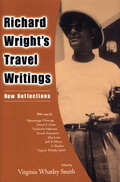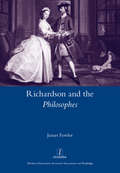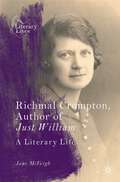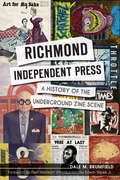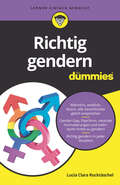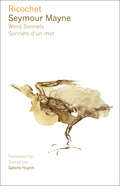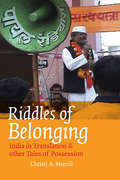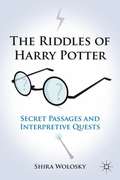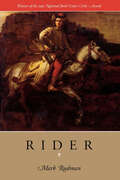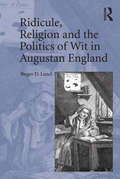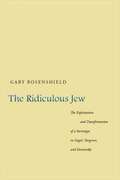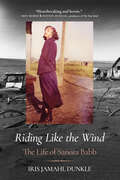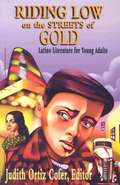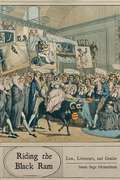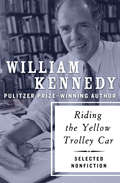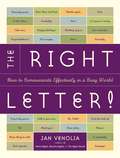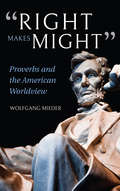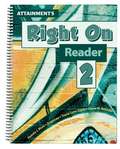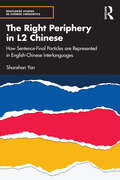- Table View
- List View
Richard Wright's Travel Writings: New Reflections
by Virginia Whatley SmithAttracted to remote lands by his interest in the postcolonial struggle, Richard Wright (1908-1960) became one of the few African Americans of his time to engage in travel writing. He went to emerging nations not as a sightseer but as a student of their cultures, learning the politics and the processes of social transformation. When Wright fled from the United States in 1946 to live as an expatriate in Paris, he was exposed to intellectual thoughts and challenges that transcended his social and political education in America. Three events broadened his world view—his introduction to French existentialism, the rise of the Pan-Africanist movement to decolonize Africa, and Indonesia's declaration of independence from colonial rule in 1945. During the 1950s as he traveled to emerging nations, his encounters produced four travel narratives—Black Power (1953), The Color Curtain (1956), Pagan Spain (1956), and White Man, Listen! (1957). Upon his death in 1960, he left behind an unfinished book on French West Africa, which exists only in notes, outlines, and a draft. Written by multinational scholars, this collection of essays exploring Wright's travel writings shows how in his hands the genre of travel writing resisted, adapted, or modified the forms and formats practiced by white authors. Enhanced by nine photographs taken by Wright during his travels, the essays focus on each of Wright's four separate narratives as well as upon his unfinished book and reveal how Wright drew on such non-Western influences as the African American slave narrative and Asian literature of protest and resistance. The essays critique Wright's representation of customs and people and employ a broad range of interpretive modes, including the theories of formalism, feminism, and postmodernism, among others. Wright's travel books are proven to be innovative narratives that laid down the roots of such later genres as postcolonial literature, contemporary travel writing, and resistance literature.
Richardson and the Philosophes
by James FowlerIn mid-eighteenth-century Europe, a taste for sentiment accompanied the 'rise of the novel', and the success of Samuel Richardson (1689-1761) played a vital role in this. James Fowler's new study is the first to compare the response of the most famous philosophes to the Richardson phenomenon. Voltaire, who claims to despise the novel, writes four 'Richardsonian' fictions; Diderot's fascination with the English author is expressed in La Religieuse, Rousseau's in Julie - the century's bestseller. Yet the philosophes' response remains ambivalent. On the one hand they admire Richardson's ability to make the reader weep. On the other, they champion a range of Enlightenment beliefs which he, an enthusiast of Milton, vehemently opposed. In death as in life, the English author exacerbates the philosophes' rivalry. The eulogy which Diderot writes in 1761 implicitly asks: who can write a new Clarissa? But also: whose social, philosophical or political ideas will triumph as a result?
Riches From Our Earth
by C. Truman RogersThe final installment of the Reading Street curriculum series, Reading Street: Grade 6, comes complete with everything you'll need to create English and Language Arts lessons for your child. This system includes reading selections designed to help your child hone his or her skills, a Teacher Resource DVD to make your task of developing lessons easier, and a packet of curriculum materials. Reading Street: Grade 6 is a comprehensive system designed to enhance your child's skills in reading, writing and language. Each assignment in Reading Street helps your child progress toward that goal. While such a dynamic curriculum might sound challenging for you as a parent and educator to use, you can rest assured that the materials will guide you through 12 weeks of English and Language Arts lesson planning with ease. If you prefer a structured homeschooling program format, Reading Street (in all of its Grade level structures) is the right fit for you and your child. Grade 6 comes with two volumes of six units. By the time you complete Grade 6, your child will be able to: Read through a variety of complex literature, including biographies and fictional stories. Discover additional reading material based on personal taste. Relate individual chapters or concepts to the book as a whole. Write complete stories using proper grammar, punctuation and word choice. Compose a written argument using appropriate sources. Examine and edit his or her own writing, as well as the writing of others. Present an oral presentation based on the lessons. Unlike other curricula, Reading Street imparts a love of reading upon your child. From Grade 1 through Grade 6, your child will learn not only the skills he or she needs to advance his or her education, but become a lifelong student and reader. For more information about the specific materials included in the Reading Street: Grade 6 curriculum for homeschooling, visit the Features and Benefits page.
Riches, Poverty, and the Faithful
by Mark D. MathewsIn the book of Revelation, John appeals to the faithful to avoid the temptations of wealth, which he connects with evil and disobedience within secular society. New Testament scholars have traditionally viewed his somewhat radical stance as a reaction to the social injustices and idolatry of the imperial Roman cults of the day. Mark D. Mathews argues that John's rejection of affluence was instead shaped by ideas in the Jewish literature of the Second Temple period which associated the rich with the wicked and viewed the poor as the righteous. Mathews explores how traditions preserved in the Epistle of Enoch and later Enochic texts played a formative role in shaping John's theological perspective. This book will be of interest to those researching poverty and wealth in early Christian communities and the relationship between the traditions preserved in the Dead Sea Scrolls and New Testament.
Richmal Crompton, Author of Just William: A Literary Life (Literary Lives)
by Jane McVeighRichmal Crompton, Author of Just William: A Literary Life celebrates the first two William books, Just William (1922) and More William (1922). As well as a study of her famous character William Brown, this book is an introduction to Richmal Crompton’s less well-known fiction and a story about her writing life. Her multifaceted identity—her deep knowledge of Classical Greek and Latin literature and languages, her life as a disabled writer, and her writing about domestic violence and disability—played a role in her literary persona. Jane McVeigh moves beyond Richmal Crompton’s impact on children’s literature and offers an appraisal of all her writing including her novels and short fiction, her media profile on radio and TV, her impact on her readers—both adults and children—and her international success. Particularly, McVeigh considers Crompton in the context of twentieth century woman writers and the development of crossover fiction for dual audiences. The book argues that as a woman writer pigeon-holed as a writer for children, Crompton’s other novels and short stories have been side-lined and overlooked. More than a century after the first book collection of Crompton’s William stories was published, this biography places Richmal Crompton among other twentieth century women writers.
Richmond Independent Press: A History of the Underground Zine Scene
by Dale M BrumfieldAn acclaimed local author recounts the evolution of Richmond&’s alternative newspapers, comics, and small presses beginning in the Civil Rights Era. As the political and social upheaval of the 1960s took hold across the United States, even the sleepy town of Richmond, Virginia, experienced a countercultural shift. New attitudes about the value of journalism spurred an underground movement in the press. &“The Sunflower,&” Richmond&’s first underground newspaper, appeared in 1967 and set the stage for a host of alternative local media lasting into the 1990s and beyond. Publications such as the &“Richmond Chronicle,&” &“Richmond Mercury,&” and &“Commonwealth Times,&” as well as numerous minority-focused presses such as &“Richmond Afro-American,&” served the progressive-minded citizens of the River City. In Richmond Independent Press, the historian, activist and former &“ThroTTle&” editor Dale Brumfield reveals the untold story of this cultural revolution in the River City.</
Richtig gendern für Dummies (Für Dummies)
by Lucia Clara RocktäschelSie möchten Menschen aller Geschlechter gleichermaßen ansprechen, wissen aber nicht, wie das am besten funktioniert? Lucia Clara Rocktäschel stellt Ihnen in diesem Buch sechs Arten zu gendern vor: von der Paarform über den Gender-Gap bis hin zu unauffälligeren Varianten wie neutralen Formulierungen oder dem Prinzip der Rollenverteilung. Ganz ohne Moralkeule zeigt sie, warum gendergerechte Sprache wichtig ist und wie Sie diese richtig umsetzen - in Studium und Beruf oder auch im Internet. Konkrete Beispiele zeigen Ihnen, wie Sie das Gendern sogar mit Suchmaschinenoptimierung und Barrierefreiheit in Einklang bringen können.
Rick's Carrot: Targeting the r Sound (Speech Bubbles 2)
by Melissa PalmerRick is hungry, but his carrot has disappeared! Who has taken it? Come along on the mission to find it. This picture book targets the /r/ sound and is part of Speech Bubbles 2, a series of picture books that target specific speech sounds within the story. The series can be used for children receiving speech therapy, for children who have a speech sound delay/disorder, or simply as an activity for children’s speech sound development and/or phonological awareness. They are ideal for use by parents, teachers or caregivers. Bright pictures and a fun story create an engaging activity perfect for sound awareness. Picture books are sold individually, or in a pack. There are currently two packs available – Speech Bubbles 1 and Speech Bubbles 2. Please see further titles in the series for stories targeting other speech sounds.
Ricochet: Word Sonnets - Sonnets d'un mot
by Seymour MayneRicochet is a bilingual collection of word sonnets by one of the chief innovators of the form, Seymour Mayne. It includes three sequences of pithy and evocative poems that encapsulate moments of sharp perception while also drawing attention to instants of humour that suddenly appear in daily life. Concise and visual in effect, word sonnets are fourteen line poems, with one word per line. Frequently allusive and imagistic, they can also be irreverent and playful. While informed by other short poetry forms such as the Haiku, Mayne’s word sonnets are deeply influenced by the Talmudic tradition of maxims, proverbs and images that instruct and inform everyday life. Presented with an excellent translation of the poems into French, Ricochet is a unique volume that showcases this innovative new form. The collection also includes a short preface by the poet and an introductory essay by the translator on the challenges of translating word sonnets.
Riddles of Belonging: India in Translation and Other Tales of Possession
by Christi A. MerrillCan the subaltern joke? Christi A. Merrill answers by invoking riddling, oral-based fictions from Hindi, Rajasthani, Sanskrit, and Urdu that dare to laugh at what traditions often keep hidden-whether spouse abuse, ethnic violence, or the uncertain legacies of a divinely wrought sex change. Herself a skilled translator, Merrill uses these examples to investigate the expectation that translated work should allow the non-English-speaking subaltern to speak directly to the English-speaking reader. She plays with the trope of speaking to argue against treating a translated text as property, as a singular material object to be "carried across" (as trans-latus implies.) She refigures translation as a performative "telling in turn," from the Hindi word anuvad, to explain how a text might be multiply possessed. She thereby challenges the distinction between "original" and "derivative," fundamental to nationalist and literary discourse, humoring our melancholic fixation on what is lost. Instead, she offers strategies for playing along with the subversive wit found in translated texts. Sly jokes and spirited double entendres, she suggests, require equally spirited double hearings.The playful lessons offered by these narratives provide insight into the networks of transnational relations connecting us across a sea of differences. Generations of multilingual audiences in India have been navigating this "Ocean of the Stream of Stories" since before the 11th century, arriving at a fluid sense of commonality across languages. Salman Rushdie is not the first to pose crucial questions of belonging by telling a version of this narrative: the work of non-English-language writers like Vijay Dan Detha, whose tales are at the core of this book, asks what responsibilities we have to make the rights and wrongs of these fictions come alive "age after age."
The Riddles of Harry Potter
by Shira WoloskyThe Riddles of Harry Potter draws readers into the deeper meanings of these phenomenally successful books, arguing that they launch and pursue interpretive quests in an ongoing effort to understand patterns and their attendant meanings, implications, and consequences.
Ride the Edge (Georgia)
by Isabel L. Beck Roger C. Farr Dorothy S. StricklandNIMAC-sourced textbook
Rider: The Rider Quintet, vol. 1 (Wesleyan Poetry Series)
by Mark RudmanRudman skillfully explores his own life and past.Winner of the National Book Critics Circle Award for Poetry (1995) Mark Rudman – poet, essayist, translator, and teacher – has consistently pursued questions of human relationship and identity, and in Rider he takes the poetry of autobiography and confessional to a new plane. In a polyphonic narrative that combines verse with lyrical prose and often humorous dialogue, Rudman examines his own coming-of-age through the lens of his relationships with his grandfather, father, step-father, and son. These memories emerge against the background of a family history anchored in the traditions of Judaism and the culture of the diaspora.
Ridicule, Religion and the Politics of Wit in Augustan England
by Roger D. LundArguing for the importance of wit beyond its use as a literary device, Roger D. Lund outlines the process by which writers in Restoration and eighteenth-century England struggled to define an appropriate role for wit in the public sphere. He traces its unpredictable effects in works of philosophy, religious pamphlets, and legal writing and examines what happens when literary wit is deliberately used to undermine the judgment of individuals and to destabilize established institutions of church and state. Beginning with a discussion of wit's association with deception, Lund suggests that suspicion of wit and the imagination emerges in attacks on the Restoration stage, in the persecution of The Craftsman, and in criticism directed at Thomas Hobbes's Leviathan and works by writers like the Earl of Shaftesbury, Thomas Woolston, and Thomas Paine. Anxieties about wit, Lund shows, were in part responsible for attempts to suppress new communal venues such as coffee houses and clubs and for the Church's condemnation of the seditious pamphlets made possible by the lapse of the Licensing Act in 1695. Finally, the establishment's conviction that wit, ridicule, satire, and innuendo are subversive rhetorical forms is glaringly at play in attempts to use libel trials to translate the fear of wit as a metaphorical transgression of public decorum into an actual violation of the civil code.
The Ridiculous Jew
by Gary RosenshieldThis book is a study devoted to exploring the use of a Russian version of the Jewish stereotype (the ridiculous Jew) in the works of three of the greatest writers of the nineteenth century. Rosenshield does not attempt to expose the stereotype-which was self-consciously and unashamedly employed. Rather, he examines how stereotypes are used to further the very different artistic, cultural, and ideological agendas of each writer. What distinguishes this book from others is that it explores the problems that arise when an ethnic stereotype is so fully incorporated into a work of art that it takes on a life of its own, often undermining the intentions of its author as well as many of the defining elements of the stereotype itself. With each these writers, the Jewish stereotype precipitates a literary transformation, taking their work into an uncomfortable space for the author and a challenging one for readers.
Riding Like the Wind: The Life of Sanora Babb
by Iris Jamahl DunkleThis saga of a writer done dirty resurrects the silenced voice of Sanora Babb, peerless author of midcentury American literature. In 1939, when John Steinbeck's The Grapes of Wrath was published, it became an instant bestseller and a prevailing narrative in the nation's collective imagination of the era. But it also stopped the publication of another important novel, silencing a gifted writer who was more intimately connected to the true experiences of Dust Bowl migrants. In Riding Like the Wind, renowned biographer Iris Jamahl Dunkle revives the groundbreaking voice of Sanora Babb. Dunkle follows Babb from her impoverished childhood in eastern Colorado to California. There, she befriended the era's literati, including Ray Bradbury and Ralph Ellison; entered into an illegal marriage; and was blacklisted by the House Un-American Activities Committee. It was Babb's field notes and oral histories of migrant farmworkers that Steinbeck relied on to write his novel. But this is not merely a saga of literary usurping; on her own merits, Babb's impact was profound. Her life and work feature heavily in Ken Burns's award-winning documentary The Dust Bowl and inspired Kristin Hannah in her bestseller The Four Winds. Riding Like the Wind reminds us with fresh awareness that the stories we know—and who tells them—can change the way we remember history.
Riding Low Through Streets of Gold: Latino Literature for Young Adults
by Judith Ortiz CoferThe pieces in this anthology for young adults reveal the struggles of discovering a new self and the trials of leaving behind an old one. This extraordinary collection gathers a wealth of stories and poems that explore the challenges of negotiating identity and relationships with others, struggling with authority, learning to love oneself and challenging the roles society demands of teenagers and adults. Edited by well-known poet and prose-writer Judith Ortiz Cofer, the collection includes work by such leading Latino writers as Pat Mora, Jesus Salvador Trevino, Tomas Rivera, Virgil Suarez, Jose Marti, Viramontes and Ortiz Cofer herself. Included as well are new voices that represent the freshness and vigor of youth: Mike Padilla, Daniel Chacon, and Sarah Cortez. For many students across the United States, this text will serve as their first rewarding introduction to diverse writers of Latino/Latina literature.
Riding the Black Ram
by Susan Sage HeinzelmanHeinzelman (English, U. of Texas at Austin) juxtaposes legal and literary narratives within their historical contexts in order to demonstrate how they are mutually constitutive and in order to reveal how both narrative approaches are articulated within a nomos, as understood in Robert M. Cover's 1983 essay "Foreword: Nomos and Narrative" as the overall normative universe. However, finding Cover's regulating nomos to exclude women's experiences and to privilege male kinship relationships, she coins the term nostos as a necessary supplement to nomos that articulates its gendered nature and, in contrast to nomos's production of narratives of regulation and equity, identifies and produces otherwise unarticulated and gendered narratives of desire. Chapters discuss the juxtaposition of the Chaucer's "Man of Law's Tale" with the "Wife of Bath's Tale, the juxtaposition of 17th and 18th-century romance novels by French and English women writers with juridical narratives, how the disciplinary and generic formation and policing of novelistic and legal discourses in the 17th and 18th centuries are disturbed and gendered by Mary Delarivier Manley's 1714 novel Rivella, the operation of discursive boundaries in three narratives of a 1752 trial of a woman for the murder of her father, and the gendered and sexualized tropes found in cultural representations of three queens (including a cartoon of Queen Caroline published during her 1820 trial for treasonous adultery that depicts the queen as riding a black ram into the House of Lords, which Heinzelman reads as a metaphor for women's disruptive presence). Annotation ©2010 Book News, Inc. , Portland, OR (booknews. com)
Riding the Yellow Trolley Car: Selected Nonfiction
by William KennedyThe collected nonfiction of the Pulitzer Prize–winning author of Ironweed: &“A great pleasure to read no matter what the subject&” (Library Journal). When William Kennedy arrives in Barcelona, his guidebook recommends taking the trolley around town—but the trolleys haven&’t run in the city for years. He&’s on his way to interview the novelist Gabriel García Márquez when, out of the corner of his eye, he sees something impossible: a yellow trolley running down the street. Márquez, however, is not surprised; like all great writers of both fiction and nonfiction, he knows that impossible things happen every day. A remarkable collection from one of America&’s greatest authors, Riding the Yellow Trolley Car features work from all stages of Kennedy&’s career. Through each piece runs the thread that ties together his greatest works: a love and deep understanding of his hometown, the city of Albany, New York, and the good and evil men who have made it what it is. Featuring interviews and essays on some of the most prominent authors of the twentieth century, from Saul Bellow and E. L. Doctorow to Norman Mailer and the legendary García Márquez—as well as insightful reflections on topics from baseball to the death of a prominent cat to Kennedy&’s wife&’s hiccups—Riding the Yellow Trolley Car is an essential book for all those who love to read, or live to write.
The Right Letter: How to Communicate Effectively in a Busy World (Right! Series)
by Jan VenoliaReplaces previous edition.In today'¬?s hectic world of cell phones, email, and instant messages, is it still worthwhile to know how to write a good letter? Absolutely! An attractive, well-written letter can grab the reader'¬?s attention and hold it long after someone else'¬?s email has been discarded. It can make a strong, lasting impression on a hiring manager, potential client, or faraway friend who receives it. In other words, the letter is still an important professional and personal communication tool, one that too few people know about these days. In this completely revised and updated edition of BETTER LETTERS, writing authority Jan Venolia dispenses expert advice on creating the perfect letter, covering composition, style, and format. With THE RIGHT LETTER! your message will rise above the rest. This handy, portable addition to the Right! series (650,000 copies sold) is an important guide to effective letter writing, including a section on email. With so many people complaining about the glut of email, spam, and misinformation, this reference is needed now more than ever. Previous editions of BETTER LETTERS have sold more than 80,000 copies.From the Trade Paperback edition.
"Right Makes Might": Proverbs and the American Worldview
by Wolfgang Mieder“A powerful and timely addition to the literature of rhetoric and folklore.” —ChoiceIn 1860, Abraham Lincoln employed the proverb Right makes might—opposite of the more aggressive Might makes right—in his famed Cooper Union address. While Lincoln did not originate the proverb, his use of it in this critical speech indicates that the fourteenth century phrase had taken on new ethical and democratic connotations in the nineteenth century. In this collection, famed scholar of proverbs Wolfgang Mieder explores the multifaceted use and function of proverbs through the history of the United States, from their early beginnings up through their use by such modern-day politicians as Barack Obama, Hillary Rodham Clinton, and Bernie Sanders. Building on previous publications and unpublished research, Mieder explores sociopolitical aspects of the American worldview as expressed through the use of proverbs in politics, women’s rights, and the civil rights movement—and by looking at the use of proverbial phrases, Mieder demonstrates how one traditional phrase can take on numerous expressive roles over time, and how they continue to play a key role in our contemporary moment.
"Right Makes Might": Proverbs and the American Worldview
by Wolfgang Mieder“A powerful and timely addition to the literature of rhetoric and folklore.” —ChoiceIn 1860, Abraham Lincoln employed the proverb Right makes might—opposite of the more aggressive Might makes right—in his famed Cooper Union address. While Lincoln did not originate the proverb, his use of it in this critical speech indicates that the fourteenth century phrase had taken on new ethical and democratic connotations in the nineteenth century. In this collection, famed scholar of proverbs Wolfgang Mieder explores the multifaceted use and function of proverbs through the history of the United States, from their early beginnings up through their use by such modern-day politicians as Barack Obama, Hillary Rodham Clinton, and Bernie Sanders. Building on previous publications and unpublished research, Mieder explores sociopolitical aspects of the American worldview as expressed through the use of proverbs in politics, women’s rights, and the civil rights movement—and by looking at the use of proverbial phrases, Mieder demonstrates how one traditional phrase can take on numerous expressive roles over time, and how they continue to play a key role in our contemporary moment.
Right On Reader 2
by Pamela J. Mims Angel Lee Tracie-Lynn Zakas Diane M. Browder Jo Reynolds Beverly Potts Linda R. SchreiberA systematic language arts curriculum for middle and high school studentsResearch has shown Teaching to Standards: English Language Arts to be highly effective in teaching skills that align to grade-level standards.
The Right Periphery in L2 Chinese: How Sentence-Final Particles are Represented in English-Chinese Interlanguages (Routledge Studies in Chinese Linguistics)
by Shanshan YanThe Right Periphery in L2 Chinese is among the first books to try to incorporate both advanced linguistic and acquisition perspectives to show how eight sentence-final particles are represented in English-speaking learners’ L2 Chinese. This book will inform researchers of the general construction of the right periphery in L2 grammars. Drawing on up-to-date theoretical frameworks and findings from advanced empirical studies, it sketches the general picture of the periphery that these particles occupy in English-Chinese interlanguages. Readers will grasp the problems and difficulties, and particularly the ambiguities, which learners of Chinese must grapple with in the process of acquiring sentence-final particles. Possible influential factors underlying the acquisition process are explicitly discussed as well. Researchers will also find insights in the advanced methodologies and statistics that are used to study Chinese. The book will be illuminating for researchers interested in SLA, linguists of generative theories, and educators teaching Chinese as a second/foreign language.
